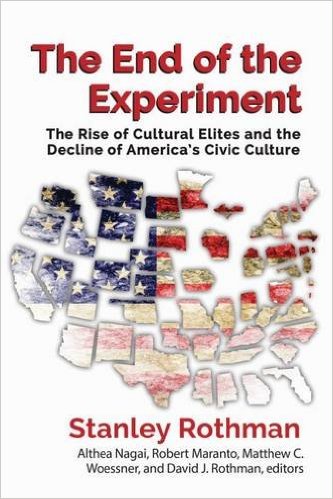University of Arkansas professor Robert Maranto co-edited the last book of Stanley Rothman, a Smith College political scientist who coined the term "media elite." The book was recently published posthumously by Transaction.
"Rothman spent decades surveying and studying the value of American elites," said Maranto, who holds the Twenty-First Century Chair in Leadership. He joined the faculty of the College of Education and Health Professions in 2008. This is the 12 book written or edited by Maranto.
"In the provocatively titled The End of the Experiment, Rothman asks the ultimate question, 'Can our nation endure if American intellectuals dislike America? If they see America as oppressive rather than liberating?' Rothman ended the title with a period rather than a question mark, foreshadowing his conclusion."
Rothman, who directed the Center for the Study of Social and Political Change at Smith College and was Mary Huggins Gamble Professor Emeritus of Government, died in 2011. The book is subtitled "The Rise of the Cultural Elites and the Decline of America's Civic Culture."
Rothman showed that, in the past, American artistic, cultural, educational, business and political elites believed in American exceptionalism, Maranto said.
"They believed in a bundle of values captured in founding documents such as the Declaration of Independence and the Constitution that included the rule of law, religiosity, a Calvinist approach to work and self, class mobility, representative government and limited government," Maranto said. "Rothman shows that, over the past century, support for America's founding values fell away, first among intellectuals, then among other cultural elites taking their cues from intellectuals, and increasingly across society."
Rothman believed national community was replaced by individual narcissism, along with a narrow focus on class, race, gender and gender-related identity politics to the near exclusion of more universal frames of reference, Maranto said.
"A part of this is elite hostility to the traditionally restraining role of religion, and conversely, the hostility of the religious to the traditionally restraining role of the state," Maranto said. "All this is ill-suited to our nation's continuation. Rothman's thesis frames the rise of 'culture war' politics now dominating the Republican, and to a lesser degree, the Democratic presidential primaries."
A tribute to Rothman's work was also recently published by Academic Questions, the journal of the National Association of Scholars of which Rothman was a founding member and chairman of the board. The winter 2015 issue includes an essay by Maranto on Rothman and his work. In "A Madisonian Man," Maranto summarizes Rothman's work, stressing his modesty as a social scientist and as a man.
"Wisdom made Rothman sufficiently unsure of himself as to take others seriously," Maranto wrote. "He did not wish to impose his will on others, but rather to study why others wished to impose their will on others."
Contacts
Heidi Wells, director of communications
College of Education and Health Professions
479-575-3138, heidisw@uark.edu
